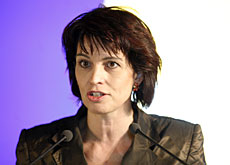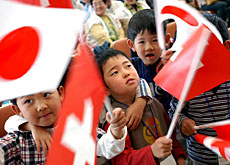Leuthard says trade talks at “decisive stage”

The Swiss economics minister says it is still possible to conclude the Doha round of trade talks by the end of the year but admits progress will be "difficult".
Doris Leuthard said on Thursday a strong political will existed among nations to strike a deal despite the continued failure to reach a consensus.
Time is of the essence for the stalled Doha round as the Bush administration’s fast-track trade negotiation powers are due to expire at the end of June.
Earlier this week Pascal Lamy, director general of the Geneva-based World Trade Organization, warned that the lack of effective leadership from the United States at this “critical juncture” could sink hopes of an accord.
Speaking in Geneva, Leuthard said the next few weeks would decide whether a deal could be achieved before the end of the year or whether obstacles, notably the sticky agriculture dossier, were too big to overcome for the moment.
“We have now reached a decisive stage when we will see whether we can find a solution this year,” she said.
US posing problems
The Swiss economics minister said slow progress had been maintained since ministers met for talks in Geneva in February but added that the US was still posing problems.
“Even if President Bush and his administration are in favour of being more flexible, in practice this does not produce concrete results,” she said.
Leuthard added that it was unclear whether the Democrat-controlled Congress would renew the White House’s trade negotiation powers, but she said there were “positive signals”.
The Doha round of talks, launched in the Qatari capital in 2001, have stalled mainly on agriculture but developed and developing countries are also a long way apart on cutting import tariffs for industrial goods.
A WTO deal could give the world economy a boost and lift millions out of poverty through trade.
Bilateral ties
In the absence of a multilateral trade deal, Leuthard said Switzerland would continue to pursue further bilateral ties with the European Union, Switzerland’s biggest trading partner, and others.
A free-trade accord with Japan was a top priority, she said, and negotiations would begin in Geneva in May.
The Swiss economics minister said she was also keen to boost trade ties with the so-called BRIC countries – Brazil, Russia, India and China. She said these nations, which only account for around five per cent of Swiss trade, offered an “enormous potential”.
On the domestic front, Leuthard spoke of the need for reforms, not least to increase competitiveness – something repeatedly highlighted by the Organisation for Economic Cooperation and Development.
Among her goals is the introduction in Switzerland of the so-called “Cassis de Dijon” principle taken from EU law – under which a product legally manufactured in one EU state may circulate freely in another. She also wants to cut red tape.
swissinfo, Adam Beaumont in Geneva
Leuthard said on Thursday that World Bank President Paul Wolfowitz had to consider whether he was “the right person” to head an institution that prided itself on its tough anti-corruption stance.
The Swiss economics minister stopped short of calling for his resignation, but said she hoped that an internal inquiry would bring a “solution” in the coming weeks.
Wolfowitz, a former member of the Bush administration, faces calls to resign after revelations that he approved a promotion and pay rise for his partner, an employee of the bank, before she was assigned to work at the US State Department.

In compliance with the JTI standards
More: SWI swissinfo.ch certified by the Journalism Trust Initiative











You can find an overview of ongoing debates with our journalists here . Please join us!
If you want to start a conversation about a topic raised in this article or want to report factual errors, email us at english@swissinfo.ch.